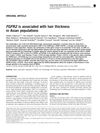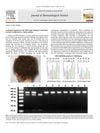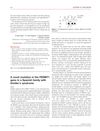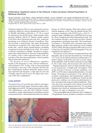 61 citations,
April 2009 in “British journal of dermatology/British journal of dermatology, Supplement”
61 citations,
April 2009 in “British journal of dermatology/British journal of dermatology, Supplement” Docetaxel and paclitaxel for breast cancer can cause permanent, severe hair loss.
 45 citations,
July 2009 in “Journal of human genetics”
45 citations,
July 2009 in “Journal of human genetics” A gene variation is linked to hair thickness in Asians.
 45 citations,
January 1992 in “Dermatology”
45 citations,
January 1992 in “Dermatology” Half of the patients treated with a specific drug for skin cancer experienced hair loss not related to the drug's dosage.
 26 citations,
February 1998 in “Chemico-Biological Interactions”
26 citations,
February 1998 in “Chemico-Biological Interactions” Scientists identified three genes important for processing certain brain chemicals, thyroid hormones, and medications.
 14 citations,
April 2019 in “Genes”
14 citations,
April 2019 in “Genes” Researchers found a genetic region that influences the number of coat layers in dogs.
 13 citations,
November 2009 in “Journal of Dermatological Science”
13 citations,
November 2009 in “Journal of Dermatological Science” A gene mutation causes woolly hair in a Syrian patient.
 11 citations,
October 2001 in “Dermatologic Clinics”
11 citations,
October 2001 in “Dermatologic Clinics” The document concludes that DAB389-IL2 is promising for treating refractory cutaneous T-cell lymphoma, but more research is needed on its effectiveness and side effect management.
 10 citations,
March 2015 in “Journal of dermatology”
10 citations,
March 2015 in “Journal of dermatology” The boy's severe skin disorder is caused by two new mutations in his TGM1 gene.
 9 citations,
March 2018 in “European journal of dermatology/EJD. European journal of dermatology”
9 citations,
March 2018 in “European journal of dermatology/EJD. European journal of dermatology” A new mutation in the ST14 gene causes a rare skin and hair disorder in a specific family.
 8 citations,
June 2012 in “PloS one”
8 citations,
June 2012 in “PloS one” Mutations in Plcd1 and Plcd3 together cause severe hair loss in mice.
 8 citations,
December 2009 in “Journal of The European Academy of Dermatology and Venereology”
8 citations,
December 2009 in “Journal of The European Academy of Dermatology and Venereology” Researchers found a new mutation in the FERMT1 gene in a Spanish family with Kindler syndrome.
 7 citations,
June 2016 in “Bone Research”
7 citations,
June 2016 in “Bone Research” A Chinese family had a child with a specific gene mutation causing vitamin D-resistant rickets, but the child improved with calcium and low-dose calcitriol.
 7 citations,
January 2015 in “Dermatology”
7 citations,
January 2015 in “Dermatology” Two gene variations, rs6493497 and rs7176005, may be linked to female hair loss in Chinese people.
 7 citations,
March 2011 in “Hormone and Metabolic Research”
7 citations,
March 2011 in “Hormone and Metabolic Research” Certain gene variations might help protect against insulin resistance and glucose intolerance in people with Polycystic Ovary Syndrome.
 5 citations,
March 2005 in “Journal of The American Academy of Dermatology”
5 citations,
March 2005 in “Journal of The American Academy of Dermatology”  3 citations,
January 2020 in “Acta Dermato Venereologica”
3 citations,
January 2020 in “Acta Dermato Venereologica” Netherton Syndrome can cause severe skin lesions in rare cases.
 2 citations,
December 1997 in “Journal of The American Academy of Dermatology”
2 citations,
December 1997 in “Journal of The American Academy of Dermatology” The document concludes that doctors should monitor children's brain development when treating hemangiomas with interferon alfa and consider stopping the treatment if problems arise, while also exploring drugs that might counteract side effects.
 January 2024 in “Archives of Endocrinology and Metabolism”
January 2024 in “Archives of Endocrinology and Metabolism” A new gene mutation causes insulin resistance in a girl and her mother.
 December 2023 in “JCEM case reports”
December 2023 in “JCEM case reports” A new gene variant causes glucocorticoid resistance in a mother and son.
 November 2022 in “Journal of the Endocrine Society”
November 2022 in “Journal of the Endocrine Society” A boy with a new NR5A1 gene mutation has a sex development disorder without affecting his adrenal glands.
 December 2021 in “Research Square (Research Square)”
December 2021 in “Research Square (Research Square)” Hair follicle sampling is a feasible method to measure FMRP and FMR1 mRNA levels in children.
 November 2009 in “Medical & surgical dermatology”
November 2009 in “Medical & surgical dermatology” The document concludes that Borrelia afzelii causes a skin condition in France, a gene is linked to hair loss in Caucasian women, and various genetic mutations affect skin diseases.
 1308 citations,
March 1998 in “Journal of bone and mineral research”
1308 citations,
March 1998 in “Journal of bone and mineral research” The vitamin D receptor is crucial for bone health and affects various body systems, with mutations potentially leading to disease.
 721 citations,
October 2011 in “Nature”
721 citations,
October 2011 in “Nature” Different types of long-lasting stem cells are responsible for the growth and upkeep of the mammary gland.
 506 citations,
January 2012 in “Molecular and Cellular Endocrinology”
506 citations,
January 2012 in “Molecular and Cellular Endocrinology” Melatonin affects many body functions beyond sleep by interacting with specific receptors in various tissues.
 417 citations,
September 2005 in “PLoS biology”
417 citations,
September 2005 in “PLoS biology” Understanding gene expression in hair follicles can reveal insights into hair growth and disorders.
 359 citations,
September 2017 in “European Journal of Epidemiology”
359 citations,
September 2017 in “European Journal of Epidemiology” The Rotterdam Study updated findings on elderly health, focusing on heart disease, genetics, lifestyle effects, and disease understanding.
 349 citations,
January 2005 in “The FASEB journal”
349 citations,
January 2005 in “The FASEB journal” Human skin can make serotonin and melatonin, which help protect and maintain it.
 321 citations,
March 2015 in “Nature”
321 citations,
March 2015 in “Nature” Super-enhancers controlled by pioneer factors like SOX9 are crucial for stem cell adaptability and identity.
 308 citations,
September 2010 in “Nucleic acids research”
308 citations,
September 2010 in “Nucleic acids research” Increasing mir-302 turns human hair cells into stem cells by changing gene regulation and demethylation.






























